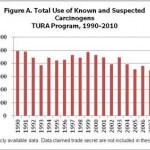carcinogens
What do these places have in common: Camp Lejeune in North Carolina; Mountain View, California, where Google headquarters are located; Endicott, NY – the birthplace of IBM; and 389 Superfund sites in at least 48 states plus Puerto Rico and the Virgin Islands? All are contaminated by trichloroethylene (TCE), a volatile organic compound classified as a carcinogen that’s been widely used as a solvent and degreaser in large-scale industrial processes, small commercial shops and in some products used by individual consumers. On June 25th, the Environmental Protection Agency (EPA) released its…
A few of the recent pieces I've liked:
Two Nature news features on antibiotic-resistant bacteria, by Maryn McKenna and Beth Mole, respectively: Antibiotic resistance: The last resort and MRSA: Farming up trouble
David Leonhardt in the New York Times: In Climbing Income Ladder, Location Matters
Jim Morris at the Center for Public Integrity: Industry muscle targets federal 'Report on Carcinogens'
Stephanie Lee in the San Francisco Chronicle/ Reporting on Health: Poverty, health struggles in scenic Mendocino
Charles Kenny & Justin Sandefur in Foreign Policy: Can Silicon Valley Save the World…
By Polly Hoppin, Dick Clapp, Molly Jacobs, Margaret Quinn and David Kriebel
We all know a woman who has been diagnosed with breast cancer, whether she’s our mother, sister, close friend or neighbor. It’s the most common invasive cancer in women in this country, and we need to get more serious about preventing it. Last month a respected group released a report on breast cancer prevention with a clear and urgent message: “identifying and mitigating the environmental causes of breast cancer is the key to reducing the number of new cases.” The report of the Interagency Breast Cancer and…
The title of this post is taken from today's opinion piece by New York Times columnist Nicholas Kristof, which focuses on carcinogens in our daily life and our failure to regulate exposure to dangerous compounds.
Kristof's point is that we should do a better job of protecting ourselves and our environment from industrial compounds. No argument there. He goes on to say that a "proliferation of chemicals in water, foods, air and household products" is suspected as a factor in rising cancer rates. Yes, argument here.
Because, geez, water is a chemical compound (hydrogen and oxygen). And the…
